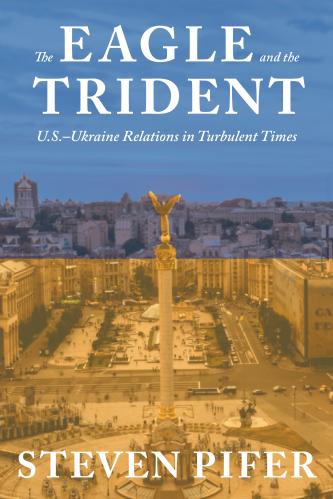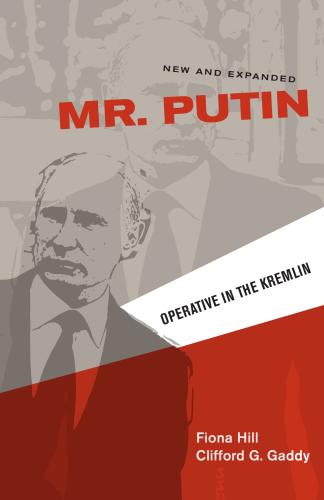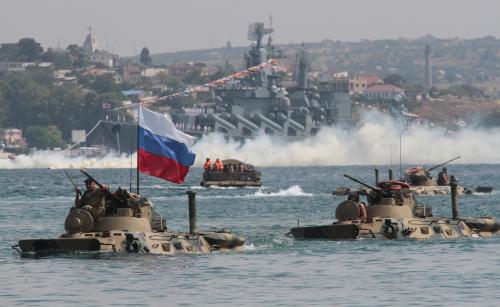When Presidents Donald Trump and Vladimir Putin meet in Helsinki on July 16, the Crimean peninsula will loom large over their summit talks. How Trump handles the issue will have implications for European security and American credibility.
Putin’s spokesperson says Crimea—which the Russian military seized from Ukraine in 2014—is a settled matter and not a topic for summit discussion. That is not quite true. The Kremlin would love nothing more than to have the U.S. president accept and recognize its illegal annexation of Crimea. That would score a big win for Putin.
Trump unfortunately has given Moscow reason for hope. While virtually all other U.S. officials maintain that the United States continues to regard Crimea as part of Ukraine, Trump says: “We’re going to have to see.” At the June G-7 summit, he reportedly suggested Crimea should belong to Russia because most people there speak Russian.
Spinning a Putin narrative
In Helsinki, there is a good chance that Putin, probably in the one-on-one meeting, will spin a case for Trump accepting Crimea’s annexation, something along the lines of: The Russian Empire colonized Crimea; its largest city, Sevastopol, was founded to be the homeport for the Russian Black Sea Fleet; Crimea was part of the Russian Soviet Federative Socialist Republic in Soviet times until 1954; and ethnic Russians constitute and for many decades have constituted the largest group there.
Putin can make a historical case for Crimea to be Russian. The case will sound reasonable to uninformed ears. It will be flawed.
When the Soviet Union collapsed in 1991, the newly independent states, including Russia, recognized one another in their then-existing borders. That made sense. Attempting to redraw borders would have opened an insoluble can of worms.
Following the Soviet Union’s demise, the Russian government accepted that Crimea was part of Ukraine and professed support for Ukraine’s territorial integrity in both bilateral and multilateral agreements. One such agreement was the 1994 Budapest Memorandum of Security Assurances, in which Russia, the United States, and Britain pledged among other things to respect Ukraine’s territorial integrity. Even Putin acknowledged at one time that Crimea belonged to Ukraine.
In his narrative for Trump, Putin will undoubtedly omit those points. He instead may cite the principle of self-determination, arguing that the people of Crimea voted to join Russia in a March 16, 2014 referendum. While a significant portion of the population might have voted that way in a free ballot, the Russian president will skip over the fact that the referendum was a sham offering just two choices: join Russia or virtual independence. If someone wanted Crimea to remain a part of Ukraine, he or she found no box to check.
Putin’s embrace of self-determination, moreover, is selective. Just look at the bloody war waged under his leadership in 2000-03 to suppress Chechnya’s bid for independence.
Putin may raise the case of Kosovo as justification, arguing that the West recognized Kosovo’s independence over Serbia’s objections. The parallel does not work. Kosovo sought independence after Serbian security forces drove out hundreds of thousands of Kosovar Albanians in 1999. It then negotiated with Serbian officials for years to find a mutually agreeable separation before acting unilaterally. In Crimea, on the other hand, there was no ethnic cleansing; local authorities conducted no negotiations with Kyiv; and the peninsula went from Ukrainian to annexed by Russia in four weeks.
The cost of not understanding details
If Trump does not understand such details, he could stumble into Putin’s trap. Doing so would significantly damage U.S. interests.
First, acceptance of Crimea as Russian would destroy a trans-Atlantic policy—largely forged under U.S. leadership—of non-recognition of the most blatant military land-grab in Europe since World War II. That would further widen the emerging rift between Washington and Europe.
Second, recognition would embolden the Kremlin to test Trump to see what other transgressions he might let pass. That would make Europe more dangerous. Finding an end to the Russian-provoked conflict in eastern Ukraine would become more difficult. Moscow could be tempted to annex Georgia’s South Ossetia or Moldova’s Transnistria.
Third, recognition would break with a long-standing U.S. policy of supporting Ukraine’s territorial integrity as well as violate commitments Washington made in the Budapest Memorandum, promises that were key to persuading Kyiv to get rid of 1,900 strategic nuclear weapons designed and built to strike the United States. It would deal a sharp blow to the credibility of U.S. commitments.
Of particular relevance now, Trump has talked about a U.S. security guarantee as part of a deal on North Korean denuclearization. It appears that North Korea may not be that interested in giving up its nuclear weapons, but how much faith could Kim Jong-un have in a U.S. security guarantee or assurance if Trump blithely walks away from an assurance made to Ukraine less than 25 years ago?
The U.S. knows how to do non-recognition
It is difficult to see how Ukraine musters the political, diplomatic, and military leverage in the near term to restore sovereignty over Crimea. That is an analytical judgment. But it was difficult in 1945 to see how the Baltic states could regain independence from the Soviet Union. The United States nevertheless patiently maintained a policy of not recognizing their incorporation into the Soviet Union for five decades…until 1991, when the Baltic states regained their independence.
Support for Ukraine and for Crimea as a part of Ukraine should similarly be a matter of principle, specifically, the principle that countries should not use force to change borders. Principle matters.
Crimea poses a minefield for Trump in Helsinki—especially as Putin, drawing on his skills as a former KGB officer, will try to play him. Trump needs to get smart on the specifics. If he does not, his go-with-his-gut approach to foreign policy risks walking into a trap and laying another egg.
The Brookings Institution is committed to quality, independence, and impact.
We are supported by a diverse array of funders. In line with our values and policies, each Brookings publication represents the sole views of its author(s).








Commentary
Trump, Putin, and Crimea
July 9, 2018